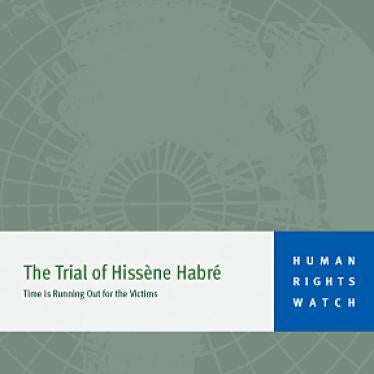(N'Djamena) - In N'Djaména, 17 victims lodged criminal complaints for torture, murder, and "disappearance" against members of the political police that operated under the regime of Hissène Habré (1982-1990). This is the first time that members of Habré's government have been brought to court in Chad.
This is the first time that members of Habré's government have been brought to court in Chad. The groundwork for today's action was set when the former dictator was indicted on torture charges last February in Senegal, where he lives in exile. In July, a Senegalese court quashed the indictment in circumstances which strongly suggested interference by the executive branch.
While appealing to the Cour de Cassation, Senegal's highest court, which is expected to rule in the months ahead, the victims are also taking their cases to the courts of Chad, the very site of the atrocities.
Among the 17 victims who filed complaints with the N'Djaména District Court against agents of the notorious National Security Service (Direction de la Documentation et de la Sécurité, DDS) were several torture victims. One frequent torture method in the detention centers of the Habré regime was the "Arbatachar," in which a prisoner's four limbs were tied together behind his back, leading to loss of circulation and paralysis. Aldoumngar Mbaidje Boukar suffered this painful experience in 1989. A former policeman, he was also tortured with electroshocks, immersed and forced to drink excessive quantities of water.
Other plaintiffs alleged the arbitrary execution and "disappearance" of family members. Mariam Abderaman's husband Bachar Bong was a top official at the Ministry of Agriculture when he was kidnapped by three agents of the DDS during the 1989 campaign of violent repression against the Zaghawa clan.
Today's action was spearheaded by the Chadian Association of Victims of Political Repression and Crime (AVCRP), which was created immediately after Habré 's fall and represents 792 victims of Habré's regime. On September 27, 2000, the President of Chad, Idriss Déby, met with leaders of the AVCRP and assured them that he would support their charges, even against former officers of the DDS who still work in Chad's administration today. The President recognized that after a decade of impunity, "the time for justice has come."
"We never accepted - and will never accept - the idea that our torturers are escaping justice," said Ismael Hachim, President of the AVCRP. "After the arrest of Hissène Habré in Senegal, we realized that we can demand that justice be done here, in our own country. Now, it's time for Chad's judicial system to do its duty."
"The indictment of Hissène Habré in Senegal alerted the international community to the breadth of his crimes and inspired solidarity towards Habré's victims," said Dobian Assingar, President of the Chadian League for Human Rights (Ligue Tchadienne des Droits de l'Homme, LTDH). "This movement was echoed in Chad itself, where civil society and the victims were empowered to take judicial action."
The dismissal of the charges in Senegal and the apparent executive interference drew protests from the United Nations, Senegal's association of judges, the New York Times and rights activists around the world.
United Nations envoys on torture and the independence of the judiciary expressed their concern to the government of Senegal over the circumstances surrounding the dismissal of the charges and called on the government to ensure an independent and impartial investigation of the allegations. The UN monitors also reminded the government of its obligations under the 1984 United Nations Convention Against Torture, which Senegal ratified in 1986, to prosecute alleged torturers who enter its territory.
A 1992 Chad truth commission report accused Habré and his government of 40,000 political murders and systematic acts of torture and brutality.
Habré, 57, took power in Chad in 1982, overthrowing the government of Goukouni Wedeye. Habré's one-party regime, supported by the United States and France, was marked by widespread abuse and campaigns against the ethnic Sara (1986) Hadjerai (1987) and the Zaghawa (1989). Habré was deposed in December 1990 by current president Idriss Deby.






